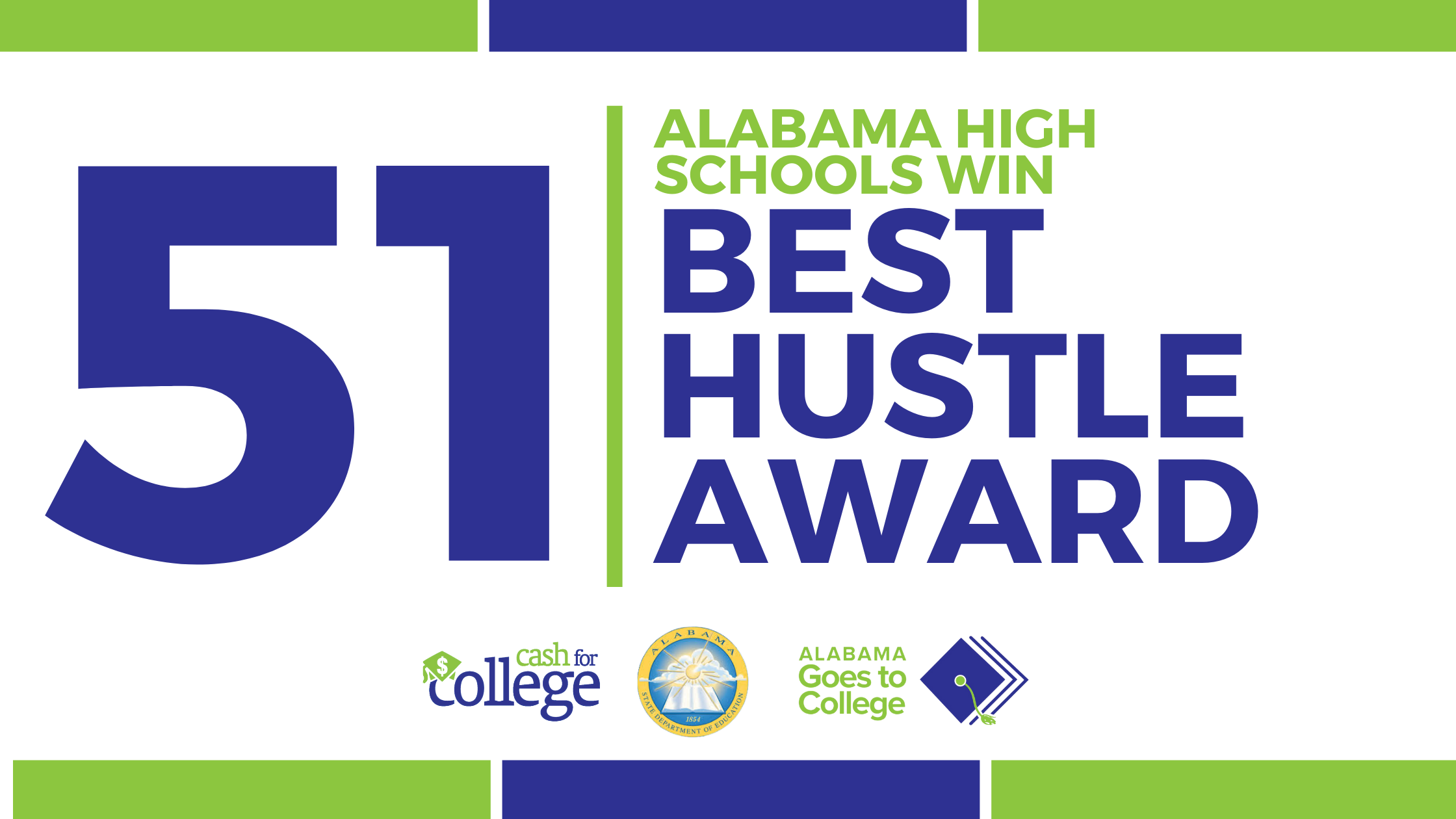Educators promote FAFSA completion to make postsecondary education accessible, affordable
BIRMINGHAM, Ala. (Jan. 6, 2021) – Alabama Possible, a statewide nonprofit that breaks down barriers to prosperity, today announced that 51 schools will receive the Best Hustle Award for successfully improving their early Free Application for Federal Student Aid (FAFSA) completion by at least 10 percent from 2019 to 2020. Early completion is defined as completion during the first two months of the FAFSA cycle (i.e., October 1 to December 1). Schools that earned this recognition include:
Ashville High School
BB Comer Memorial High School
Bibb County High School
Brooks High School
Bullock County High School
Carver Senior High School (Montgomery)
Central High School (Phenix City)
Central High School (Rockford)
Central High School (Tuscaloosa)
Choctaw County High School
Clements High School
Cleveland High School
Colbert County High School
Colbert Heights High School
Crossville High School
Falkville High School
Fort Payne High School
Francis Marion School
Fruitdale High School
Fyffe High School
Gaston High School
Genesis Innovative School
Greensboro High School
Highland Home School
Ider School
Lanier Senior High School
Locust Fork High School
Millry High School
Mountain Brook High School
Oneonta High School
Plainview High School
Ragland High School
Ranburne High School
Red Bay High School
Reeltown High School
Samson High School
Scottsboro High School
Section High School
Sheffield High School
Southside High School (Dallas County)
Spain Park High School
Spring Garden High School
Sulligent School
Sumter Central High School
Sylvania School
Theodore High School
Valley Head High School
Virgil Grissom High School
Wadley High School
Washington County High School
West Limestone High School
All the listed schools participate in the Alabama Goes to College campaign, which is coordinated by Alabama Possible. Cash for College, a component of the Alabama Goes to College campaign, works with school counselors, career coaches, and other educators at high schools across the state to equip students to continue their education after high school by completing their financial aid form.
More than 350 Alabama high schools participate in Alabama Goes to College. By December 1, 2020, nearly 12,000 Alabama high school seniors had already completed the FAFSA. Despite barriers caused by COVID-19, counselors and students know completing the FAFSA is the gateway to postsecondary financial aid.
“During these unprecedented times, we must not lose sight of the importance of equipping students with tools and resources for a postsecondary pathway,” said Chandra Scott, executive director of Alabama Possible. “We are encouraged by the number of schools that continue to assist their students in early FAFSA completion and we congratulate them on being recipients of the Best Hustle Award.”
Any student seeking federal or state financial aid – including grants, loans, and work-study programs – must complete the FAFSA. Most Alabama students qualify for Pell Grants of up to $6,345 per year. Students can use Pell Grants for two-year and four-year technical and academic programs. If you want to learn more about the FAFSA and Cash for College, visit alabamagoestocollege.org.
Alabama aims to add 500,000 individuals with valuable postsecondary credentials to its workforce by 2025, and Governor Kay Ivey’s Success Plus strategic plan recognizes the critical role that financial aid plays in making education after high school accessible and affordable.
Alabama Goes to College is a partnership of Alabama Possible and the Alabama State Department of Education, with the support of the Alabama Community College System and Alabama Commission on Higher Education.
About Alabama Possible
Alabama Possible is a statewide nonprofit organization that breaks down barriers to prosperity through advocacy, education and collaboration. We influence public policy to ensure every high school graduate in our state can pursue a technical or academic credential after high school. Our programs connect Alabama’s educational leaders, students and families with the resources necessary to cultivate a college-going culture and equitable educational attainment. For more information, visit www.alabamapossible.org
